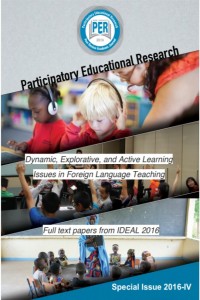Abstract
References
- Blass, Laurie, Hannah Friesen and Kathy Block (2008). Creating Meaning. Hong Kong: Oxford University Press.
- Carr, N. (2008). Is Google Making Us Stupid? http://www.theatlantic.com/magazine/archive/2008/07/is-google-making-us-stupid/306868/ Accessed on August 14, 2016.
- McIntosh, E. (2012). Googleable or Not Googleable? http://edu.blogs.com/edublogs/2012/06/googleable-or-not-googleable.html Accessed on August 14, 2016.
- Mergendoller, J. (2012). Teaching Critical Thinking Skills through Project Based Learning. Retrieved August 16, 2016 from http://www.p21.org/ tools-and-resources/p21blog/1097-teaching-critical-thinking-skills through -project-based-learning
- Non-googleale Questions. http://www.acleadersresource.sa.edu.au/features/pilot/DECD_TfEL%20PILOT_Non-googleable%20questions_download_web.pdf Accessed on August 14, 2016.
- OECD (2015). Students, Computers and Learning: Making the Connection, PISA, OECD Publishing. http://dx.doi.org/10.1787/9789264239555-en Accessed on August 14, 2016.
- Pinker, S. (2010). Mind Over Mass Media. http://www.nytimes.com/2010/06/11/opinion/11Pinker.html?_r=0 Accessed on August 14, 2016.
- Tan, Z. Y. (2016). OK, Google, Where Did I Put My Thinking Cap? http://www.npr.org/sections/alltechconsidered/2016/02/05/465699380/ok-google-where-did-i-put-my-thinking-cap Accessed on August 14, 2016. https://www.google.com/about/company/history/ Accessed on August 14, 2016.
Abstract
Writing is one of the two major productive skills
in language learning; and just like its oral equivalent ‘speaking’, it involves
text production. Considering the development of writing skill from an
educational point of view, it can be said that producing written text is
generally based on the regular writing assignments given to students in
language classes. While studying on the assignments, one of the most important
responsibilities of the students is to avoid copy-paste and therefore
plagiarism. However, in some cases students may tend to copy-paste availing
themselves of the vast opportunities offered by Google. This all-knowing
database appears as one of the most ground-breaking innovations of the late
20th and early 21st century and has recently been the number-one destination
for people with any kind of question in their minds. Nevertheless, asking
everything to Google and using the readily available answer directly in
writings is not something desirable in terms of developing writing skill, let
alone concerns about copyright and ethics. Therefore, the assigned topic should
orient students to employ their imagination, creativity, and critical thinking
skills at utmost level while leaving them an acceptable amount of space to
consult Google. Under this framework, this study aims to compare googleable and
non-googleable writing topics with a focus on their pros and cons. To this end,
sample writing topics covered in writing books taught at university level in
Turkey will be investigated in terms of the extent to which they appear
googleable or non-googleable.
Keywords
References
- Blass, Laurie, Hannah Friesen and Kathy Block (2008). Creating Meaning. Hong Kong: Oxford University Press.
- Carr, N. (2008). Is Google Making Us Stupid? http://www.theatlantic.com/magazine/archive/2008/07/is-google-making-us-stupid/306868/ Accessed on August 14, 2016.
- McIntosh, E. (2012). Googleable or Not Googleable? http://edu.blogs.com/edublogs/2012/06/googleable-or-not-googleable.html Accessed on August 14, 2016.
- Mergendoller, J. (2012). Teaching Critical Thinking Skills through Project Based Learning. Retrieved August 16, 2016 from http://www.p21.org/ tools-and-resources/p21blog/1097-teaching-critical-thinking-skills through -project-based-learning
- Non-googleale Questions. http://www.acleadersresource.sa.edu.au/features/pilot/DECD_TfEL%20PILOT_Non-googleable%20questions_download_web.pdf Accessed on August 14, 2016.
- OECD (2015). Students, Computers and Learning: Making the Connection, PISA, OECD Publishing. http://dx.doi.org/10.1787/9789264239555-en Accessed on August 14, 2016.
- Pinker, S. (2010). Mind Over Mass Media. http://www.nytimes.com/2010/06/11/opinion/11Pinker.html?_r=0 Accessed on August 14, 2016.
- Tan, Z. Y. (2016). OK, Google, Where Did I Put My Thinking Cap? http://www.npr.org/sections/alltechconsidered/2016/02/05/465699380/ok-google-where-did-i-put-my-thinking-cap Accessed on August 14, 2016. https://www.google.com/about/company/history/ Accessed on August 14, 2016.
Details
| Primary Language | English |
|---|---|
| Subjects | Studies on Education |
| Journal Section | Research Articles |
| Authors | |
| Publication Date | December 1, 2017 |
| Acceptance Date | November 30, 2016 |
| Published in Issue | Year 2017 Volume: 4 Issue: 2 |



